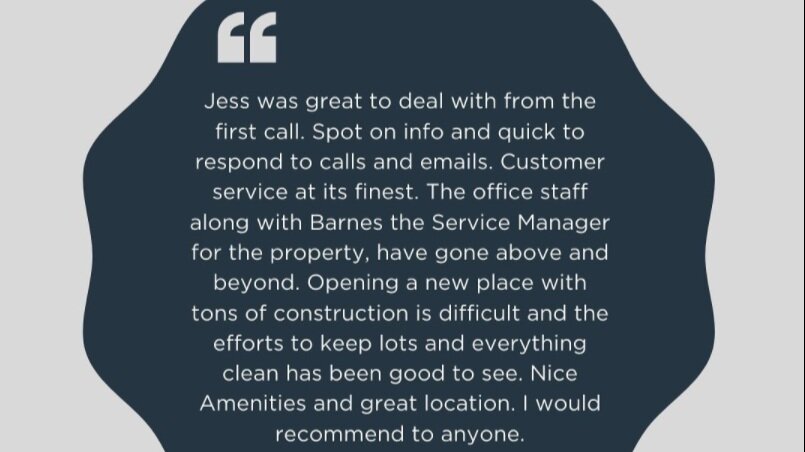Learn what Reputation Management is, how professionals in the multi-family housing industry can optimize their online reputation, SEO, and Digible’s approach to responding to reviews.
What is Reputation Management?
Reputation Management is the practice of creating strategies to change or influence the public’s perception of a brand. Ultimately, it is an opportunity to take back control of the conversations happening by responding to positive reviews as well as criticism online while taking a proactive (and public) step in correcting someone’s poor experience in your community. It’s taking a step in the right direction, ensuring that your property is NOT Joan Jett and DOES give a damn about their reputation.
88% of consumers say reviews influence them in discovering a local business (Podium, 2021). It’s no doubt a positive reputation online helps apartment seekers trust the property, converts searchers into leads, and boosts local search rankings.
Monitor Your Online Presence Through Listings, Reviews, and Social Media.
If you’re already doing this great! If all of this sounds like too much for your team to handle then there are several vendors in the Property Management space that offer services, like review responses, citation management, or Organic Social content writing – we’re always happy to make vendor recommendations, just ask!
Responding to Reviews
Responding to reviews on ILS platforms, such as Google, Apartments.com, Yelp, and AptRatings, will show future residents who are researching your property that you take resident feedback seriously, and act swiftly when notified of issues. Online reviews are not only important for renters, but 51% of potential residents expect to see management responses to all online reviews.
Reach – Customers express their negative experiences, knowing that review platforms are a way to communicate with brands.
Remedy – A proactive approach, whether this results from an intervention on behalf of the brand, a second positive experience outweighing an initial negative one, or the consumer is self-correcting their own misunderstanding.
Restoration – The unhappy customer is restored to the business as a happy one, hopefully, ready to trust the brand for future transactions, and the reputation of the brand is restored by an edited review reflecting better satisfaction.
57 % of negative customer reviews focus on customer service and employee behavior. It is vital to remind the property’s on-site team about the significance of their interactions with current and future residents (Moz, 2020).
1. Respond to reviews quickly, within 1-2 business days.
2. Evaluate and rectify the situation. This is important to do, even if the negative review is not changed.
3. Address the complaint with compassionate candor and apologize for the dissatisfaction.
4. Offer to remedy the situation or work on solutions.
Review Response Example:
Thank you {{customer_first_name}} for your review. At {{property_name}}, we constantly strive to improve our customer service and feedback like yours helps us grow and improve. Customer service is the most important thing we do, so it is disheartening to hear about your issue. Please feel free to give our office a call at {{business_phone_number}} so we can further discuss your concerns and work on solutions.
Thank you again, the {{property_name}} team
Ethical Ways a Property Can Ask for Reviews
76% of consumers that are asked to leave a review go on to write one. (BrightLocal)
When it comes to asking for reviews, we don’t recommend soliciting reviews in bulk via email or text message as that could trigger negative action by Google. Receiving too many reviews in a short period of time could raise suspicion and Google could flag or suspend the account. Tread lightly on soliciting reviews with incentives like gift cards or raffles, which could lead to biased reviews. Here’s more info on Google’s review policy. Yelp strongly advises not to ask for reviews at all. Learn more about their approach
In the Format Specific Criteria section of Google’s review guidelines, you’ll find the following under Text Reviews and Captions. Google can remove reviews they feel may have violated these policies, even if they have no specific proof that the policy was violated. However, if you have a way to trickle out a few email requests at a time (or if you can slowly release a newsletter to a few folks at a time) you can ask via these platforms. You just want to make sure that all reviews don’t come in at the same time and trigger Google’s notice.
1) In-person
Whether a current resident or future resident participating in a tour or signing a lease.
“Hi {Resident Name},
We’d love to hear about your experience in our community. Future residents rely on online reviews to ensure they get the best service possible. We would appreciate it if you could take a moment to leave us a testimonial on our Google page. Thank you!”
2) Over the phone
3) Community Communication
If a community board or resident portal is available, like ActiveBuilding
4) In an email to an individual or to a small group of residentsSuggested Subject: We’d Love To Hear From You OR Share Your Experience in Our Community
Example:
Hello [First Name],
We are so grateful for our residents! We value your feedback and would love to hear about your experience in our community if you could take a moment to leave us a review.
Your insights are incredibly valuable and will help us ensure we are fostering a welcoming environment for our residents and to learn about opportunities for us to grow and improve.
Thank you for taking the time to share your opinion.
Best Regards,
The Team at [Property Name]
5) In an email signature with a link to a review page
This could include Google, AptRatings, and other ILS sites where your property is present, along with any social media handles.
Humble Brag About Your Reviews on Social
 Another neat way to highlight reviews is to take the review text (from a place like Google, Apartments.com, or similar) and curate the text into a visual design, like Canva. Attribute it to the reviewer (omit their last name for privacy purposes) and the platform it came from so it’s easy to verify and post it on a secondary platform like Google Business Profile (GBP), Facebook, Instagram, etc. It’s a great way to get people looking at your stellar reviews in other places.
Another neat way to highlight reviews is to take the review text (from a place like Google, Apartments.com, or similar) and curate the text into a visual design, like Canva. Attribute it to the reviewer (omit their last name for privacy purposes) and the platform it came from so it’s easy to verify and post it on a secondary platform like Google Business Profile (GBP), Facebook, Instagram, etc. It’s a great way to get people looking at your stellar reviews in other places.
Another Reason to Give A Damn About Reputation Management?
It Helps with Local SEO!
Reviews are vital for Search Engine Optimization. Review Quantity and Quality are figured into your overall SEO rankings for Google Maps and your organic website rankings. Responding to reviews helps improve your SEO rankings as well. Even Google recommends responding to reviews to help improve your visibility.
Actively responding to reviews enhances your Google Business Profile by allowing visitors to see your engagement with your community and it shows Google that you are active on GBP, keeping your information accurate and taking interest in what your current renters think about your property and services.
We know that a strong Google Business Profile can enhance the visibility of a property in Maps by showing up in the map pack or knowledge panel, and in Search by helping improve the authority of the website that is linked to the GBP profile. Reviews are a must for a strong Google Business Profile. But don’t stop at Google reviews. An optimized GBP is important, but having great reviews on many different review platforms shows that you have a lot of fans in a lot of places, enhancing your relevance as a property that stands out.
You’re Living in the Past, It’s a New Generation.
A generation to care about your reputation! Whether your property is in the lease-up phase or an established community, reputation management is necessary for your brand and is a way to engage with current and future residents.
Questions? Want to learn more about how we can support Reputation Management or SEO for your property? Drop us a line.








